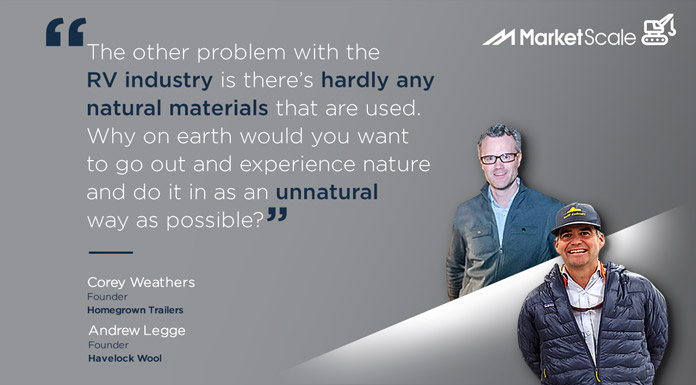
Demand for sustainable and healthy building materials is experiencing explosive growth…. and not just in traditional residential construction. In this month’s podcast we sit down with the CEO of Homegrown Trailers Corey Weathers to discuss his partnership with us and how using all natural wool insulation fits into his mission of creating compact, environmentally conscious and really cool travel trailers. Take a listen below!
Renting an RV for a road trip has become a staple of American culture and family bonding. But for a vehicle meant to enable a closer connection to nature, renting an RV is also equated to funny smells and a machine that wasn’t too friendly to the environment meant to be explored. Enter Homegrown Trailers, a company that is making something completely different.
Today we sat down with Corey Weathers, co-founder and CEO of Homegrown Trailers, and Andrew Legge, founder and managing partner of Havelock Wool, to look at a design partnership that’s reinventing the RV. Wool doesn’t immediately scream “RV” when its traditional uses are considered, but this green project has truly broken the mold of what a traditional RV has been and can be.
“There were people who wanted to travel healthily and couldn’t be in [an RV] or spend the night in one,” Weathers said, “so it limited their ability to have that kind of lifestyle. Our unit opened up new possibilities for them because of how it’s made and what it’s made with.”
After looking at the Living Building Challenge, wool came up as an option and Weathers happened to have a conversation with Legge about using wool for trailers. Originally, they were using loose fill that got packed into walls with netting to hold it into place, but Havelock was able to provide them rolls of wool, which streamlined the process, making it up to a third faster.
“There’s always a challenge going to a new material,” Weathers said, especially when using a green material. “It may not be the easiest material to work with.” They both describe their design challenges, the pros and cons of wool in RVs, as well as the customer feedback they’ve received due to using wool in these units.
